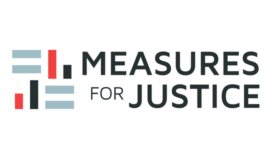
Measures for Justice
Model & Strategy
Nearly every public institution or resource in the United States—our schools, our hospitals, our water supply—is accountable to a watchdog system. But there are few ways to gauge and compare how local criminal justice systems perform basic legal services. Counties don’t know what data to collect, or what the right measures are, let alone what specific areas need to improve.
Measures for Justice (MFJ), as a neutral third party, has built a way to identify and correct systemic problems in criminal justice systems across the country. It aims to fill a major gap: the lack of a national infrastructure for comparative measurement in criminal justice. MFJ has partnered with the Department of Justice’s Bureau of Justice Assistance. Together they will create a foundational tool based on the premise that public policy decision-making requires good data, a comprehensive base of information, and knowledge. No system can improve without law and policy makers knowing what exactly is going wrong. Simply put: No data, no change.



Amy Bach founded Measures for Justice in April 2011 to address problems she researched for her book, Ordinary Injustice: How America Holds Court, which won the 2010 Robert F. Kennedy Book Award and other acclaim (see www.ordinaryinjustice.com). A graduate of Stanford Law School and member of the New York Bar, Bach began to research the book in 2001 and was quickly struck by widespread patterns of errors, invisible to the very people who work with these problems every day. Bach decided she had to do more than just write about the myriad injustices she witnessed, and launched Measures for Justice. Echoing Green selected her as a 2011 Fellow out of 3,000 candidates worldwide. Bach was previously a Knight Foundation Journalism Fellow at Yale Law School, a Soros Justice Fellow, and a fellow at the Radcliffe Institute for Advanced Study at Harvard University. She has taught criminal law at SUNY Buffalo Law School as a visiting professor. She lives in Rochester, NY.

IMPACT
MFJ launched its Data Portal in 2017 with data from over 370 counties in six states: Florida, Pennsylvania, Wisconsin, Utah, Washington, and North Carolina. The Data Portal is free and easy to use; and almost all data can be filtered by age, sex, race/ethnicity, offense type and severity, and attorney type. More data from additional states including Arizona, Missouri, North Dakota, New York, and California and updated data from current states are forthcoming.
MFJ’s methodology for processing mass amounts of disparate data has become the model for other states and organizations. MFJ is now scaling nationwide and will measure 20 states by the end of 2020. MFJ aims to refresh all its data at least every two years.
Based on their work, in 2018, Florida signed into law a groundbreaking bill to collect uniform and comprehensive data and to publish them in one central repository.
Measures for Justice News
-
 Charles Bronfman Prize Names Amy Bach, Founder of Measures for Justice, as 2018 RecipientThe Charles Bronfman Prize announced its 2018 recipient: Amy Bach, Founder, Executive Director and President of Measures for Justice (MFJ), the first organization to publicly…Sep 2018
Charles Bronfman Prize Names Amy Bach, Founder of Measures for Justice, as 2018 RecipientThe Charles Bronfman Prize announced its 2018 recipient: Amy Bach, Founder, Executive Director and President of Measures for Justice (MFJ), the first organization to publicly…Sep 2018 -
 Missing: Criminal Justice DataWhy don’t we have better criminal justice data? Because justice in this country is primarily local. The United States has over 3,000 counties, and each…Mar 2018
Missing: Criminal Justice DataWhy don’t we have better criminal justice data? Because justice in this country is primarily local. The United States has over 3,000 counties, and each…Mar 2018 -
 Data Quest: Why This Wonky Criminal Justice Group is Pulling in the Big BucksThe world of crowded jails, tense courtrooms, and cops on the beat is a far cry from the air-conditioned spaces data wonks usually inhabit. But…Aug 2017
Data Quest: Why This Wonky Criminal Justice Group is Pulling in the Big BucksThe world of crowded jails, tense courtrooms, and cops on the beat is a far cry from the air-conditioned spaces data wonks usually inhabit. But…Aug 2017

